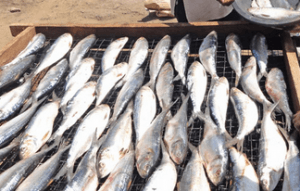University of Cape Coast benefits from $ 5.5m fisheries project
 The United States Agency for International Development (USAID) has committed $5.5 million to the implementation of a five-year capacity building programme for fisheries and coastal management project in Ghana.
The United States Agency for International Development (USAID) has committed $5.5 million to the implementation of a five-year capacity building programme for fisheries and coastal management project in Ghana.
The project, which is being implemented by the University of Cape Coast’s (UCC) Department of Fisheries and Aquatic Sciences (DFAS) started in October 2014, and would end in October 2019.
It is to improve upon the infrastructure for training and research on fisheries and coastal management, increase scientific knowledge for policy and technical advisory services, increase marine and coastal research and resource management, and to establish a centre for coastal management, among others.
Launching the project, in Cape Coast, on Tuesday, Madam Sherry Ayittey, the Minister of Fisheries and Aquaculture Development, stated that fishing was a major economic activity in Ghana, therefore, fish capture, processing, marketing and associated services constituted a significant source of livelihood.
She said the fisheries sector generated more than GH¢1 billion in revenue annually, and accounted for at least 4.5 per cent of Ghana’s Gross Domestic Product (GDP), while 210,000 people worked directly with the sector.
The Minister pointed out that in spite of the contribution of the fisheries sector to Ghana’s socio –economic development, the sector had not been able to achieve its full potential, with poverty still high in many fishing communities.
She noted that the country was faced with growing challenges in managing its coastal and marine resources, particularly, with the continuous decline in fish stock and production in the last few decades, as well as the degradation of the coastal environment.
She said statistics indicated that there was a 30 per cent decline in fish harvest from 492,776 metric tonnes, in 1999, to 333,524 metric tonnes in 2011; noting that in 2012, the overall annual fish requirement was estimated at 968,000 metric tones.
However, only about 455, 700 metric tonnes from the marine and inland fisheries were realized, thereby, creating a deficit of more than 500,000 metric tonnes.
Ms Ayittey said the over-capitalization of the fishing industry, the use of unsustainable fishing methods and pollution of coastal ecosystems, coupled with pollution, deforestation, mining, damming and irrigation threatened biodiversity across the country.
She attributed the situation to a deficiency in monitoring and enforcement of laws and regulations, lack of education, training, research, data gathering and analysis; as well as low investments in capacity building for effective natural resource management.
Ms Ayittey also stated that the poor incentive packages for staff and students to conduct research and undertake extension outreach activities were part of the factors militating against effective fisheries and coastal management efforts.
She said in this regard, the Government in collaboration with the West Africa Regional Fisheries Programme, was rolling out programmes to cover areas such as improving fisheries governance, and sustainable fisheries management, reducing illegal fishing activities, developing a sustainable aquaculture industry and improving value addition.
Professor, Paul Nelson Buah, the Pro-Vice Chancellor of UCC, in his welcoming address commended USAID for allocating funds for the project.
He said to further advance the goals of the project, the UCC recently signed a Memorandum of Understanding with the University Of Rhode Island (URI) to collaborate in areas bordering on fisheries and coastal management.
He said since the establishment of the Department of Fisheries and Aquatic Sciences (DFAS) in 2002, UCC had turned out about 200 graduates in fisheries and related sciences who were engaged in various sectors of the economy.
He expressed the hope that the project’s outcome would strengthen the Science Information base for sustainable fisheries and coastal management, and improve the livelihoods of coastal communities.
Mr Peter Trenchard, the Director of Economic Growth at the USAID Office in Ghana, tasked students to conduct research that would reverse the decline of the fish stocks and marine resources, and develop pragmatic programmes that would enhance coastal management.
He called for the inclusion of all stakeholders in the implementation of the project and asked that the research findings be made available to all.
Osabarima Kwesi Atta II, Omanhen of the Oguaa Traditional Area, who presided, called on the Ministry of Fisheries and Aquaculture Development to ensure that all polices and laws governing the marine sector were enforced and implemented to sustain the sector.
The occasion was used to inaugurate an ultra-modern Fisheries and Coastal Research Laboratory at the UCC.
Source: GNA
